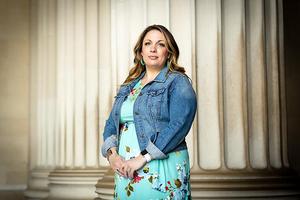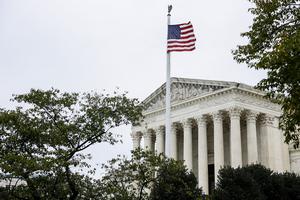Religious Freedom Expands Slowly, Uncertainly in Current US Supreme Court
Some religious plaintiffs are winning, but often on narrow grounds.

Where is the U.S. Supreme Court going on religious freedom?
The court’s current trend is to grant religious-freedom claims. That was true even before Amy Coney Barrett joined the court in October 2020, cementing a conservative-leaning majority of either 6-3 or 5-4 on certain legal disputes.
Some like that trend, arguing that it rightly furthers the ability to freely exercise religion in public. Some don’t, arguing that it blurs the line of separation of church and state, which they consider vital.
But how far will the court go? The Register recently asked constitutional-law experts to weigh in.
“I think as long as the court has its current composition, religious-liberty cases that they decide to hear will be decided in favor of the religious claimant,” said Sherif Girgis, associate professor of law at Notre Dame Law School, in a telephone interview with the Register.
Limits
A key limiting factor, though, as Girgis pointed out, is whether the court takes a case. The court has broad discretion over whether it will accept a case by issuing what is known as a “writ of certiorari.” Out of 5,000 or so cases submitted each year, the court typically agrees to hear only about 70 to 80.
Of those, the court has the ability to limit the scope, as it did when it heard the case earlier this week of Lorie Smith, a Christian website designer in Colorado who wants to offer her commercial services for what she calls “biblical marriage” but not for same-sex weddings, which she considers false. State officials say Smith’s terms violate the state’s antidiscrimination law, which includes sexual orientation as a protected class. Lawyers for the website designer invited the court to consider the case under the free-exercise-of-religion clause of the federal Constitution’s First Amendment, but the court instead limited arguments to free speech.
In certain other cases, the court has sided with religious claimants, but only on narrow grounds. The Little Sisters of the Poor, for instance, have won twice in federal Supreme Court cases (in 2016 and in 2020) over the religious order’s attempt to continue offering health insurance to its employees without paying for contraception, which Obamacare mandates for employers. The matter still hasn’t been settled.
In 2018, Jack Phillips, a Christian baker from Colorado, won a U.S. Supreme Court case over whether the state could force him to make a cake celebrating a same-sex wedding. But the court decision rested on what the court called a state commission’s “clear and impermissible hostility toward the sincere religious beliefs” of the baker; the court didn’t decide whether the baker has free-speech or free-exercise-of-religion rights to turn down same-sex weddings. Phillips is now in state court over a new dispute about whether he has the right to deny a cake celebrating a gender transition.
Such decisions lead some to wonder where the court is headed.
“It’s the most pro-religious-freedom court there’s ever been. But on this religious-discrimination issue, I’m not confident that they want to decide it on the merits,” said Dwight Duncan, a professor of law at the University of Massachusetts School of Law. “In general, they’ve been siding with the religious side, but on narrower grounds, instead of deciding the issue.”
Ditching a ‘Lemon Test’
The court has disposed of at least one legal doctrine that affected religious-liberty cases.
In 1971, the U.S. Supreme Court established the “Lemon test” for cases where government and religion interact. It’s named after the case that spawned it, Lemon v. Kurtzman, which struck down as unconstitutional state laws in Pennsylvania and Rhode Island that provided government funds to religious schools. The court decided a state statute violates the federal Constitution unless it meets three criteria: It has “a secular legislative purpose”; its “principal or primary effect … neither advances nor inhibits religion”; and it doesn’t promote “an excessive government entanglement with religion.”
But the Lemon test is now gone. The court overturned it in June 2022, in a case called Kennedy v. Bremerton School District, deciding that a public-school district couldn’t legally fire high-school football coach Joseph Kennedy for praying on one knee in the middle of the field after games because “the Constitution neither mandates nor permits the government to suppress such religious expression.”
During oral argument in April 2022, Justice Brett Kavanaugh said of Lemon, “I don’t think that is a test anymore. We haven’t applied it in two decades …”
Even so, when the court formally ditched the Lemon test in June, it effectively stopped other government entities from citing it.
“It is a big deal, because even though the court hadn’t applied it recently, lower courts, school officials and government agencies were still applying it because they’re bound by the court precedent until the court tells them otherwise,” Girgis told the Register.
The Supreme Court’s football-coach decision will stop some attempts to restrict religious expressions in public before they start, another legal observer told the Register.
“Now they have said it’s dead and stop exhuming the corpse. That’s a big deal,” said Jordan Pratt, a lawyer with First Liberty Institute, which represents clients making religious-freedom claims. “Before the Supreme Court formally overruled Lemon, the lower courts had this endorsement mechanism to scrub the public square of the divine. It’s a very judge-empowering test. It opened up a lot of avenues for mischief.”
First Liberty Institute represented the football coach in the Kennedy case.
Smith on the Chopping Block?
Some lawyers who practice in the area of religious liberty are calling for the U.S. Supreme Court to overturn a 1990 decision called Employment Division v. Smith, which found that “a neutral, generally applicable law” not specifically aimed at religion is constitutional, even if it coincidentally prohibits a religious practice.
It’s not clear when or whether that will happen, however.
“I suspect for the next few years they will generally avoid the issue, because given the tone of the opinions where they hashed it out, it sounds like a sore subject,” Girgis told the Register.
The 1990 Oregon case involved two men who were fired from their jobs at a private drug-rehabilitation organization and then denied unemployment benefits by the state after smoking a hallucinogen called peyote during a religious ceremony in the Native American church. State law at the time banned peyote.
The Supreme Court upheld the statute and the denial of unemployment benefits. The court rejected adopting a so-called “compelling-interest” test in religious-liberty cases, which would require the government to justify such a law regulating religious practice by proving it has a compelling interest to do so.
In the Christian web-designer case heard this week, lawyers for the plaintiff initially invited the Supreme Court to overrule Employment Division v. Smith. They backed off after the court in February 2022 decided to hear the case only on free-speech grounds.
Still, at least four of the nine justices seem interested in jettisoning Employment Division v. Smith, as emerged in a 2021 case called Fulton v. Philadelphia. In that case, Catholic Social Services of the Archdiocese of Philadelphia successfully sought to place children in foster care without placing them with same-sex couples, as required by the city government. On narrow grounds, the Supreme Court unanimously sided with Catholic Social Services.
‘What Are We Waiting for’
The narrowness of the ruling frustrated some on the court, however. Justice Samuel Alito, who said in a concurring opinion that he would overrule Employment Division v. Smith, called the majority opinion in Fulton v. Philadelphia “a wisp of a decision that leaves religious liberty in a confused and vulnerable state.” Justices Clarence Thomas and Neil Gorsuch also criticized Employment Division v. Smith in another concurring opinion — with Gorsuch asking (in yet another concurring opinion), “What are we waiting for?”
Justice Barrett said in a concurring opinion that she found merit in “textual and structural arguments” against Employment Division v. Smith, but also said she wasn’t sure what sort of standard should replace it.
Gorsuch noted that “not a single Justice has lifted a pen to defend” Employment Division v. Smith — but some observers think Justice Kavanaugh, who didn’t write his own opinion in Fulton v. Philadelphia, may harbor doubts about replacing Smith because he doesn’t like judges making “compelling-interest” decisions.
Also not commenting on Smith in the Fulton decision were John Roberts, the chief justice, and the three liberals, Elana Kagan, Sonia Sotomayor and Ketanji Brown Jackson.
Which leaves a currently unanswerable question: Would the court overrule Smith?
Pratt, who tries religious-liberty cases, told the Register that even if it’s unclear, it’s worth a try.
“I think it’s within the realm of possibility,” Pratt said. “This court has shown a willingness to discard precedent if it is not in accord with the original meaning of the Constitution. They did it in Dobbs. They did it in Kennedy. I think that lawyers who litigate in this area should be looking for cases to challenge Smith.”
- Keywords:
- religious freedom
- u.s. supreme court
- matt mcdonald
















